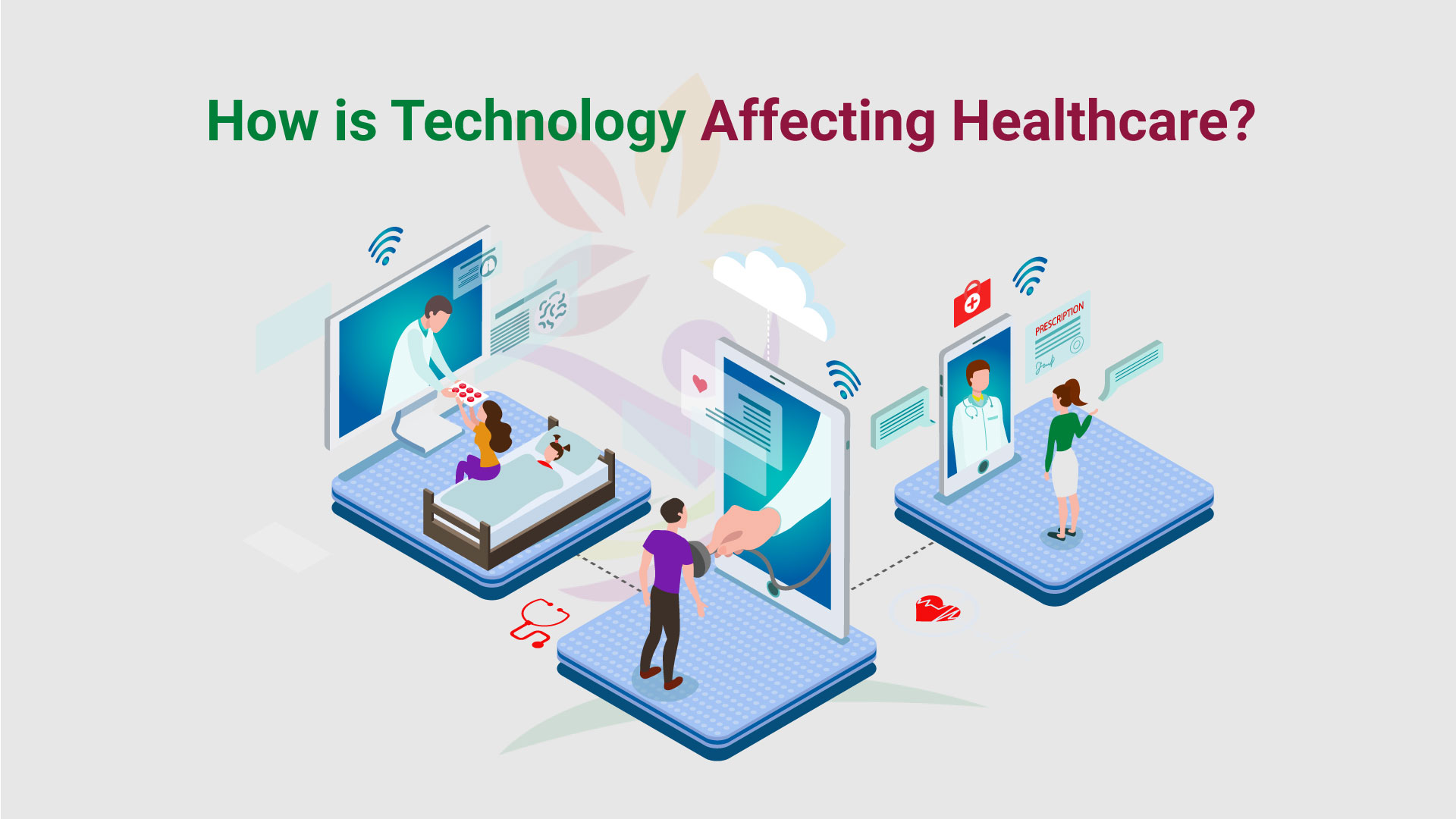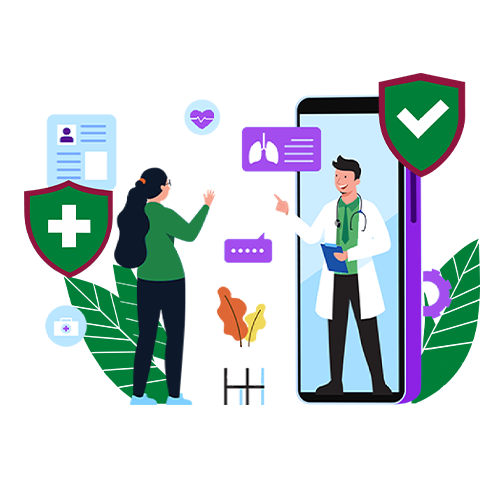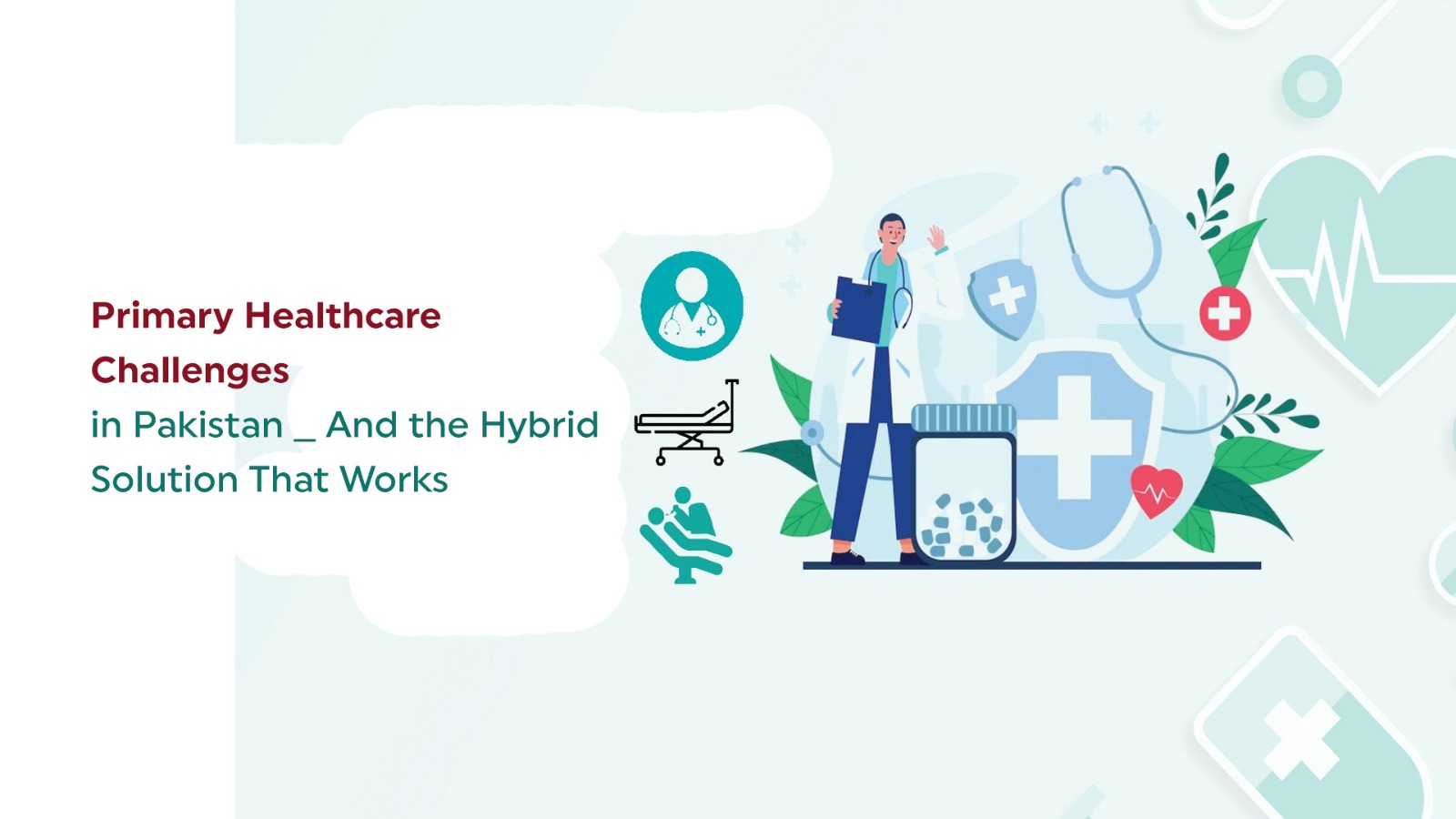In today’s era, ever-changing technology acts as a catalyst to speed up the change, resulting in the advancement of healthcare. It revolutionizes how we approach patient healthcare, management of data, and overall health outcomes.
Quick Links
ToggleIntegration in technology and progress in healthcare proceed together. While exploring comprehensively, we came across the multifaceted effects of technology on healthcare. It analyzes importance, changing trends, and the complex balance between the advantages and disadvantages it presents.
Technology in Healthcare: Evolution
The path of healthcare technology is characterized by continuous improvement driven by innovation and need. Electronic health records (EHRs) have historically shown a significant shift towards digital systems, regardless of paper-based systems, streamlining business processes and increasing access to information.
Integrating technology in healthcare has changed how patients receive their healthcare, with telemedicine ensuring remote consultations and monitoring. It also allows individuals to track their vital signs and healthcare records easily.
It has not only enhanced the accessibility but also helped to empower the patients. To take a more active role in their healthcare, resulting in a more personalized and proactive approach to healthcare.
Impact of Technology on Patient Care
Technology integration in healthcare has revolutionized patient care, enabling far-off consultations and real-time tracking, which has progressed healthcare results extensively.
Telemedicine structures have bridged the distance between patients and healthcare providers. Imparting patients with admission to clinical understanding regardless of their geographical location. Leading to well-timed in Additionally, the development of wearable health gadgets promotes method performance via making an allowance for ongoing tracking and early fitness trouble diagnosis.
Integrated Medical Records
By consolidating patient information into digital databases, healthcare providers gain admission to comprehensive scientific histories, facilitating knowledgeable selection-making and care coordination.
Integrated medical information goes beyond traditional systems. Allowing seamless information to alternate amongst healthcare professionals and promoting continuity of care throughout settings.
This enhances affected person safety, reduces duplication of services, and improves usual efficiency in the healthcare atmosphere.
Technological Improvements
The healthcare landscape is constantly fashioned with the help of technological improvements to increase the consequences for the affected person and operational efficiency.
Artificial intelligence (AI) holds great promise in revolutionizing accuracy in diagnosis and treatment plans by reading sizeable quantities of scientific facts with unparalleled accuracy and precision. Robotic-assisted surgical procedures offer surgeons greater control and quicker healing instances for patients.
Similarly, advancements in genomic sequencing and precision remedies allow focused treatment options tailored to male or female genetic profiles, resulting in a new personalized healthcare technology.
Societal Impact
Beyond patient care, the era in healthcare has a long way to go in influencing society as an entire. Telemedicine projects bridge gaps to enter healthcare offerings, particularly in remote communities, promoting health equity and inclusivity.
Moreover, digital fitness structures facilitate fitness education and recognition campaigns, empowering individuals to make informed choices about their well-being.
By leveraging population fitness analytics, policymakers, and public health officials. It can discover tendencies and allocate resources more efficaciously, resulting in progressed health effects at the community stage.
Impact of Healthcare Technology on Pakistan’s Healthcare System
Healthcare technology is revolutionizing Pakistan’s healthcare system by bridging gaps in access and quality of care.
Telemedicine services are enabling patients in remote areas to connect with specialists, while AI-powered diagnostics and digital health platforms are improving efficiency in urban healthcare centers.
Mobile health apps are empowering individuals with tools for health monitoring and awareness. Despite these advancements, challenges like limited infrastructure and digital literacy in rural regions need to be addressed for widespread adoption.
As healthcare technology continues to evolve, it holds immense potential to modernize Pakistan’s healthcare system and meet global standards.
10 Ways Technology is Changing Healthcare
- Artificial Intelligence (AI)
AI helps doctors by analyzing medical records, planning treatments, developing new drugs, and diagnosing diseases. - Virtual Reality (VR)
VR improves medical training and helps patients manage pain by creating immersive, interactive experiences. - Augmented Reality (AR)
AR overlays digital information on the real world, assisting in medical education and surgeries. - Health Trackers and Wearables
Devices like smartwatches and fitness bands let people monitor their health and share data with their doctors. - Medical Tricorders
Portable devices can measure vital signs and diagnose conditions, making healthcare more accessible. - Genome Sequencing
Advances in genetic testing allow for personalized medical insights and treatments at a lower cost. - Faster Drug Development
AI speeds up the creation of new medicines, making them cheaper and quicker to develop. - Nanotechnology
Tiny devices can deliver drugs directly to affected areas and monitor health from within the body. - Robotics
Robots assist in surgeries, patient care, and rehabilitation, improving precision and support. - 3D-Printing
3D printers create custom prosthetics, tissues, and medications, enhancing treatment options.
Pros & Cons of Technology in Healthcare
While the benefits of technology in healthcare are beyond doubt, it is essential to acknowledge the accompanying challenges and considerations. Indeed, here are some pros and cons of technology in healthcare:
Advantages of Technology in Healthcare
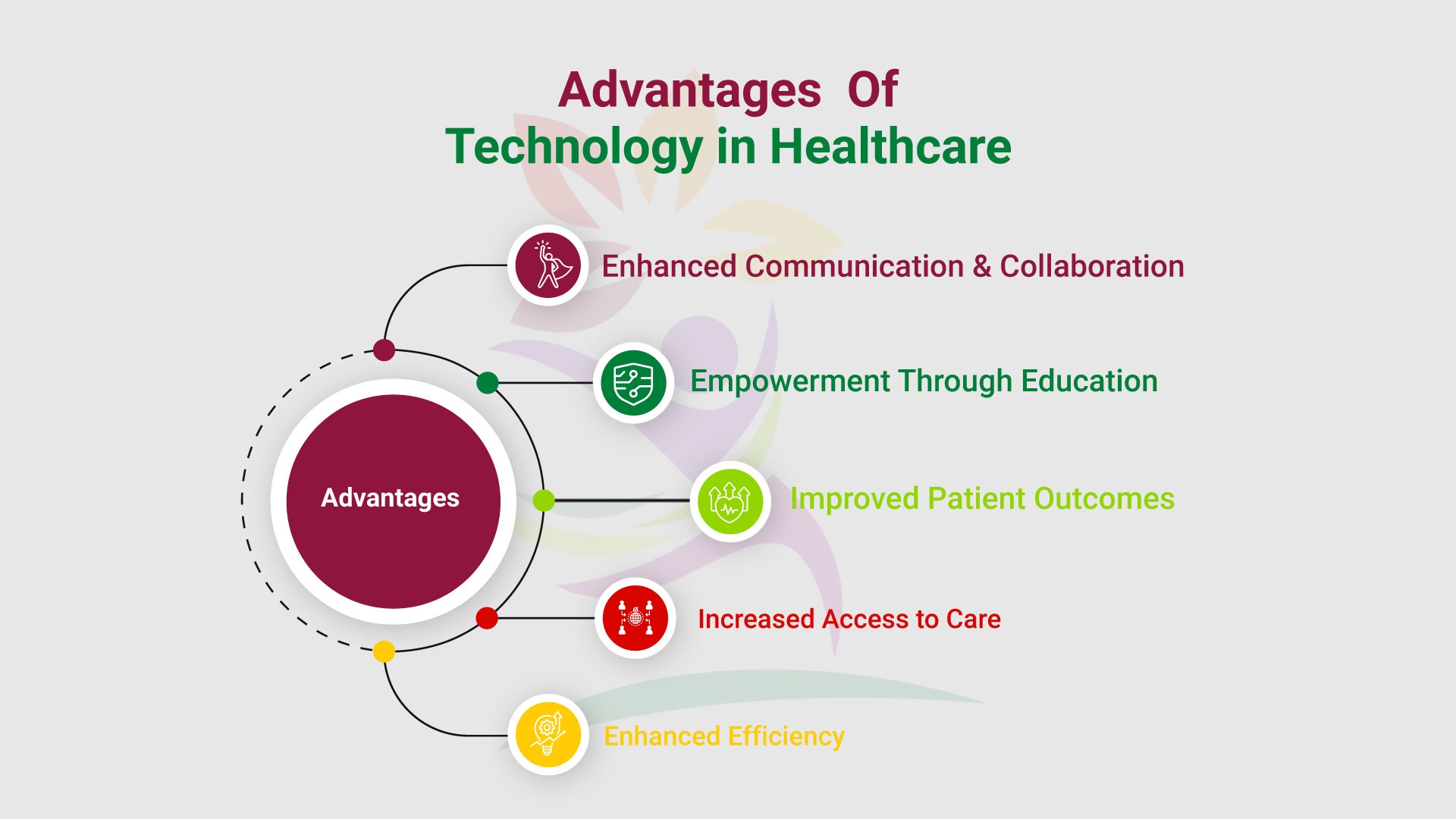
- Enhanced Efficiency: Technology streamlines administrative processes, reduces paperwork, and automates tasks, allowing healthcare providers to focus more time and resources on patient care.
- Improved Patient Outcomes: Advanced medical technologies such as robotic surgery, precision medicine, and remote monitoring devices enable more accurate diagnoses, personalized treatment plans, and better disease management, ultimately improving patient outcomes.
- Increased Access to Care: Telemedicine and digital health platforms expand access to healthcare services by enabling remote consultations, monitoring, and follow-ups.
- Enhanced Communication and Collaboration: Integrated medical records and communication tools facilitate the seamless exchange of information among healthcare providers, promoting care coordination, interdisciplinary collaboration, and continuity of care for patients.
- Empowerment Through Education: Digital health resources and mobile applications empower patients to actively engage in healthcare by providing access to educational materials, health tracking tools, and personalized health insights.
Disadvantages of Technology in Healthcare
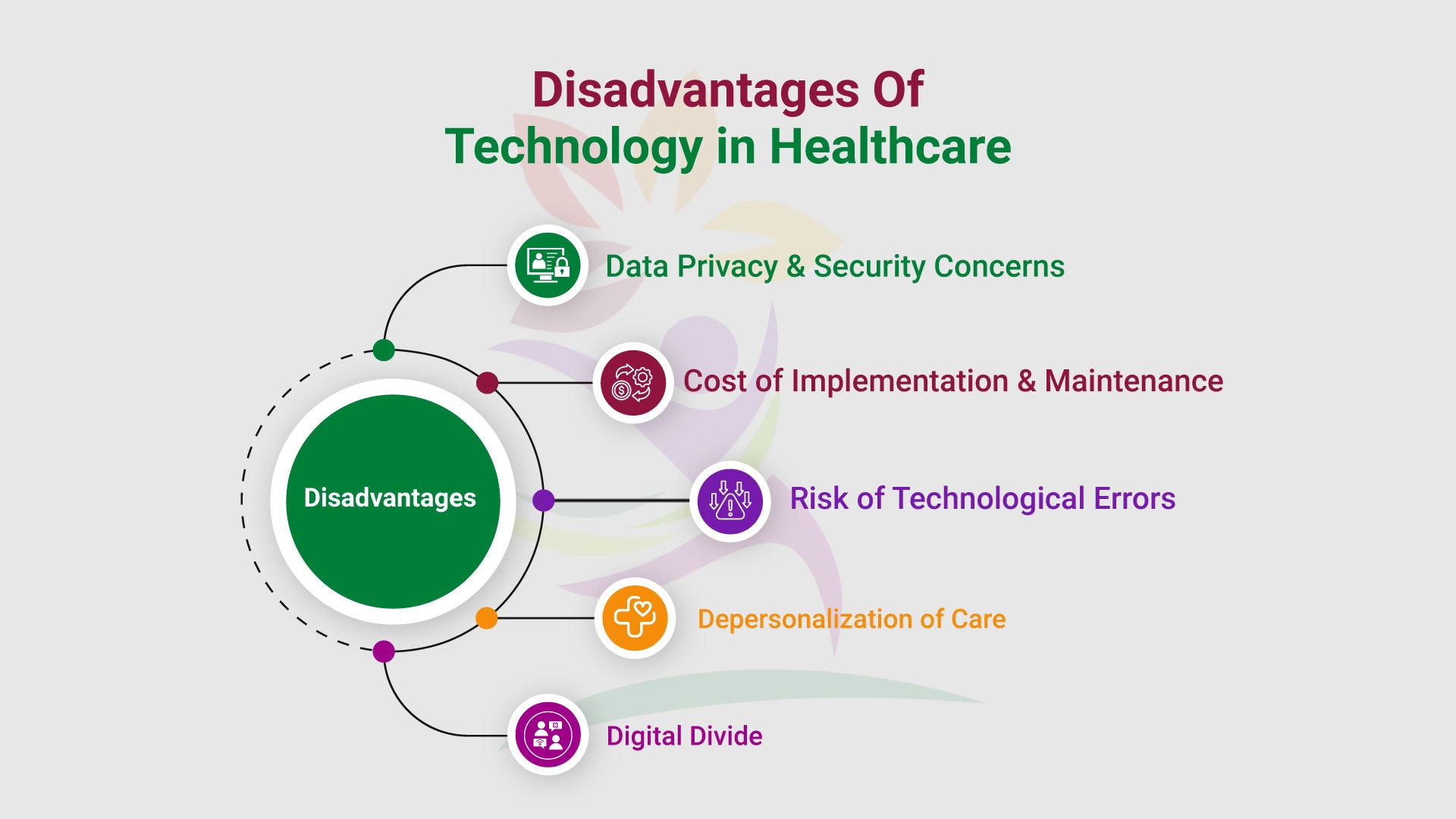
- Data Privacy and Security Concerns: These raise concerns about the privacy and security of patient data, making healthcare organizations vulnerable to cyber threats and data breaches.
- Digital Divide: The virtual divide is worsened by socioeconomic differences in access to digital knowledge and generation, even if those with limited resources do not necessarily benefit from technological improvements in healthcare.
- Depersonalization of Care: Too much reliance on technology could depersonalize patient care as digital interfaces replace human interactions, affecting the standard of relationships between providers and patients and the patient experience.
- Cost of Implementation and Maintenance: Financial difficulties can arise for healthcare companies, especially smaller practices and institutions, due to the significant initial expenditure needed to build and maintain technology infrastructure in healthcare settings.
- Risk of Technological Errors: The use of electronic systems raises the possibility of technological failures such as software bugs, interoperability problems, and incorrect data entry, which could jeopardize patient safety and clinical decision-making even with technological breakthroughs.
These advantages and disadvantages emphasize how complicated and multidimensional technology’s effects on healthcare are, emphasizing the importance of carefully weighing the risks and rewards of adopting and using it.
Conclusion
Technology integration in healthcare presents both potential and difficulties. Precision medicine and telemedicine have improved the accessibility of care for affected persons. However, troubles like customized records need to be taken into consideration. Responsible innovation adoption with patient needs as a top priority will improve healthcare delivery, boost equity, and eventually enhance anybody’s health.
Frequently Asked Questions
The term “positive technology” describes technology that is purposefully designed and used to improve well-being, encourage happy feelings, and advance human flourishing.
Technology has positively impacted both by enhancing efficiency and improved access to care, such as privacy concerns, cost, etc, and our health through innovations.
Healthcare technology can be harmful and beneficial, depending on how it is implemented and used.
Technology can affect mental health positively through access to mental health resources and support. It can also result in issues like digital addiction and increased social comparison.
Technology can be beneficial and detrimental for children, depending on usage patterns, content, and parental guidance.
The most used technology in healthcare is Electronic Health Records (EHRs), enabling efficient patient data management, followed by AI-powered tools for diagnosis, treatment planning, and virtual health assistants.
Healthcare technology is transforming Pakistan’s system by improving access through telemedicine, enhancing diagnostics with AI, and streamlining patient care via digital health platforms, though rural adoption remains a challenge.

